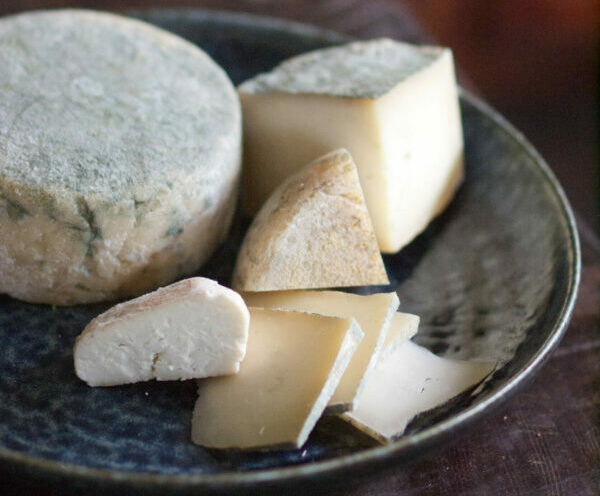Info, news & debate
Cheesemaking

Low-impact Cheesemaking
Modern industrial cheesemaking uses a bunch of electricity and single-use plastic, but there are ways to go back to basics and make beautiful cheeses using homemade cultures and off-grid cheese aging setups. In this article I’ll look at several aspects of cheesemaking, and how to approach each one in a low impact way. Milk Milk …

Our policy on keeping animals & eating meat
Our topics include vegetarianism and veganism, but also keeping animals (for meat, dairy, eggs, honey, wool, leather, work etc); and also fishing and hunting animals in the wild. Is this incongruous? As a sustainability / new economy organisation, should we be promoting only veganism, rather than the keeping and/or eating of animals?

Cow-calf dairying part 8: weaning
This is the last in a series of posts about how to run a small dairy herd without separating the calves from their mothers. This final article is about preparing the cows and calves for a stress-free weaning.

Feeding the Human Power Plant: can calories be carbon-neutral?
We take a look at the food it may take to fuel the great Human Power Plant, an experiment in the making where students of Utrecht University in the Netherlands will power their very own carbon-neutral accommodation block.

Cow-calf dairying part 7: introducing milking without the calf suckling
When a lamb or calf suckles, they bunt their mum’s udder with their heads to stimulate release of more milk. If you are share-milking, as a calf grows this bunting can quickly become so strong that it can easily knock the cluster off the other three teats.

Cow-calf dairying part 6: share milking
I have found that the first few days after a heifer has calved are critical when it comes to creating a positive association with feeding her calf and being milked by machine.

Join our new online community Living Low Impact
We’re excited to introduce our new Facebook group Living Low Impact – and you’re invited!

Cow-calf dairying part 5: creating a bond and first milking
This is where we get to the nitty-gritty of cow-calf dairying, looking at creating a bond and the first milking; but it’s important that you have understood the whole series so far (see right or click here) before reading on, as much of what is covered here relates to points made before.

Cow-calf dairying part 4: udder development
Welcome to part 4 of this series on cow-calf dairying, focusing on udder development. By now you will be starting to understand that keeping calves on dairy cows is a fine art; that it is a case of balancing the emotional and physical needs of both cow and calf; and why there are no set …

Cow-calf dairying part 3: calf rumen development
Here, in part 3 of our series on dairying without removing calves from their mothers, we look at the importance of managing a calf’s nutrition in order to support the effective calf rumen development, essential to her long-term health and productivity.

Cow-calf dairying part 2: how cows produce and give milk, and why they need their calves
In this second post in the series from the Smiling Tree cow-calf dairy we focus on how milk is synthesised and, importantly for cow-calf dairying, what triggers the release or ‘let down’ process.

Cow-calf dairying part 1: the difference between conventional and humanely-produced milk
This is the first in a series of articles looking at the practicalities of producing ethical, cruelty-free milk by allowing dairy cows to keep their calves. In this post we cover why conventional dairy cows don’t keep their calves and why humanely-produced milk using cow-calf dairying is rare and costs much more to produce.

Nanodairies gathering: for people keeping or looking to keep up to four cows
Information sharing event for people who keep from one to four dairy cows, and a training course for people who are planning to do this. Focussed uniquely on cows, not on goats or sheep. 25 & 26 February, 2016, at Monkton Wyld Court, Charmouth, Dorset.

Microdairies: making them as successful as micro-breweries
A conference on the benefits of small-scale commercial dairy farms of up to 40 cows or the equivalent of sheep or goats. How to establish them and how to promote the concept. For practising and prospective dairy farmers and others with a professional interest in the future of the British dairy industry.

Where do you stand on raw milk? Interview with ‘raw’ dairy farmer
If milk is going to be transported long distances and hanging about a lot rather than being sold locally and drunk quickly, there’s a strong argument for pasteurising it. But there is a growing number of people who are arguing that locally-produced milk doesn’t have to be.

Join the people who are fighting back against corporate control of global food production
There’s something seriously wrong with the way most of our food is produced and sold. The corporate sector is gaining control of more and more of global food production, shifting the focus from nutrition, flavour and nature towards profit and profit only.

Suggested campaign to remove unnecessary regulations from independent businesses
Three things have happened to me recently that have made me realise that local, independent and/or community-owned businesses have been put at a huge disadvantage as regards regulations that cover their activities, and the independent sector is being unnecessarily penalised for the damaging activities of the corporate sector.

Making bread, butter & cheese
We’ve just had a fantastic course here this weekend – how to make bread, butter and cheese. The breadmaking part of the course was provided by Katherine Hallewell (above). She and a friend have a small bakery in Stroud, and they make bread for local people.
